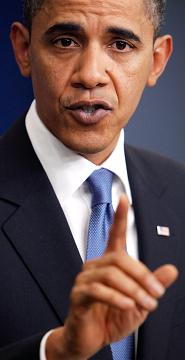
Barack Obama accuses Iran of attempt to build a nuclear bomb
Catherine Philp, Diplomatic Correspondent
The International Atomic Energy Agency confirmed that its inspectors had been called to the Natanz plant to witness the beginning of work to upgrade Iran’s 3.5 per cent enriched uranium to 20 per cent.

“Despite the posturing that the nuclear power is only for civilian use ... they in fact continue to pursue a course that would lead to weaponisation, and that is not acceptable to the international community,” Mr Obama declared. He threatened to hit Tehran with fresh UN-backed sanctions, possibly within weeks.
Russia joined Western powers in denouncing Iran’s move, which it said raised “well-grounded” doubts about the country’s peaceful intentions.
Iran says that it needs to produce 20 per cent enriched uranium to fuel a medical research reactor after balking at a UN-backed deal to supply it from abroad. Experts say that the technological leap from 20 per cent enriched uranium to weapons-grade material could be made in months.
Tehran lacks the technology to convert the uranium into fuel rods, invalidating its explanation and raising suspicions that it is moving towards producing weapons-grade uranium.
The United States said that it was aiming for a new sanctions resolution at the UN Security Council before France relinquishes the rotating chair at the end of the month.
Russia, a longtime ally that has traditionally opposed tougher measures on Iran, voiced its strongest condemnations yet, raising hopes that Moscow will back sanctions. Russia’s vote could win over China, the last to hold out amongst the council’s five permanent members.
“Iran claims it is not trying to acquire nuclear weapons,” Nikolai Patrushev, head of the Russian National Security Council, told reporters. “But actions such as starting to enrich low-enriched uranium up to 20 per cent raise doubts in other countries and these doubts are fairly well grounded.”
The process is permitted under the Non-Proliferation Treaty but is forbidden by five separate Security Council resolutions ordering Iran to halt all enrichment until the peaceful purpose of its nuclear programme can be established.
Enrichment is the process used to boost the percentage of the uranium-235 isotope by repeatedly feeding it through centrifuges. A level of 3.5 per cent purity is required to produce nuclear fuel and the first stages of enrichment are the hardest to master.
Uranium enriched to 20 per cent could be used in Tehran’s medical research reactor but only after conversion into fuel rods, a technology that Iran does not possess.
Weapons-grade uranium is more than 90 per cent enriched but Western powers fear that if Iran upgrades its fissile stockpile to 20 per cent, it could kick out inspectors and produce weapons-grade material within a month.
Iran asked international interlocutors last year to supply it with 20 per cent uranium in breach of existing UN sanctions forbidding the import of nuclear technology. The request was widely seen as a trick by which Iran could justify producing the material itself if the international community refused to supply it.
Iran soon came under pressure with the revelation that it was building a clandestine fortified enrichment plant at Qom and, under duress, Tehran agreed to a deal to swap its low-enriched uranium for 20 per cent fuel rods made by Russia and France.
The deal was scuppered by Iran’s attempts to get around the central plank of the agreement — to remove Tehran’s stocks of fissile material and delay the moment when it would have all the components necessary to build nuclear bombs.
France labelled Iran’s decision to begin higher enrichment as “blackmail” aimed at forcing the swap on its own terms. The Iranian Foreign Minister insisted yesterday that the deal was not dead and urged foreign powers to accept its conditions — to send out the uranium only in batches and to do the swap on Iranian soil.
China, Iran’s most important trading partner, said that it still held out hope that the impasse could be broken through further talks. Turkey said that it would send a delegation to Iran next week to discuss how the deal could be revived.
Washington, meanwhile, has already circulated drafts of what new sanctions could look like, closely focused to hit the Iranian central bank and companies associated with the Revolutionary Guard.
www.timesonline.co.uk/tol/news/world/middle_east/article7021192.ece
Feb. 10, 2010
